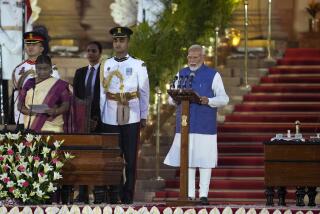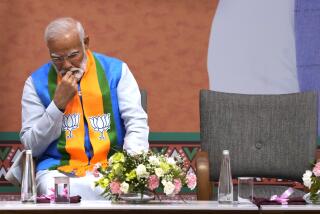Gandhi’s Party Losing in State Legislative Elections : India: The defeats in Congress-I strongholds may be the end of the political trail for the ex-prime minister.
- Share via
NEW DELHI — Hundreds of millions of Indian voters dealt yet another defeat to former Prime Minister Rajiv Gandhi and his long-ruling Nehru family on Wednesday, as results from key state elections strengthened India’s new ruling coalition.
Projections based on partial returns and announced on state-run television showed Gandhi’s Congress-I Party losing in virtually all eight Indian states electing new legislatures this week. All were traditional Congress-I strongholds that had all been controlled by the party for more than a decade.
The defeat comes just three months after Gandhi and his party were driven from power in the national Parliament. Analysts predicted that the former prime minister is likely to be replaced soon as leader of his own party, which is now India’s main opposition group.
“It is now clear that Rajiv Gandhi has, indeed, presided over the death of a dynasty,” one diplomat said of the 45-year-old former airline pilot who, as grandson of Jawaharlal Nehru and son of Indira Gandhi, was the third generation of the family’s Indian prime ministers.
Gandhi campaigned heavily in recent weeks for his party’s candidates, often flying his own plane to remote regions of all eight states. But Gandhi’s replacement, Indian Prime Minister Vishwanath Pratap Singh, whose Janata Dal (People’s Party) was leading Wednesday in several of the state contests, also barnstormed the states in a populist campaign that strengthened his own national image as a reformer.
Perhaps the most striking results, though, showed India’s newly emerged, right-wing Hindu party, the Bharatiya Janata Party (Indian People’s Party), heading for its first state victories in the key central Indian states of Rajasthan and Madhya Pradesh.
Singh, whose party won just 141 of the 525 parliamentary seats at stake in last year’s national polls, has been ruling the nation in a shaky alliance with the Hindu-fundamentalist party, which won 88 national seats, and India’s Communist parties, which won 44.
Although Wednesday’s results deepened the grass-roots base of Singh’s national alliance with the Hindu fundamentalists, analysts said they also further documented the rise of Hindu chauvinism in modern India, which officially is a secular state despite its 80% Hindu majority.
Singh’s People’s Party was expected to win by a large margin in the populous eastern state of Orissa, but it was virtually tied with the Hindu fundamentalists in the politically key western state of Gujarat, where a local coalition between the two groups is now likely.
But the results of this week’s polls also reinforced another alarming national trend in India--a sharp increase in brutal election violence.
More than 80 people were stabbed, beaten and shot to death during the voting Tuesday in one state alone, the impoverished and violent eastern state of Bihar. Armed gangs from virtually every political party in the state, where local Mafias wield more power than the politicians, commandeered scores of polling places, stuffed boxes with tens of thousands of fake ballots, shot and killed poll watchers, staged gun battles with police and kidnaped government election officials.
A slow vote count was reported in Bihar and Arunachal Pradesh.
Nationwide, analysts said that the only marginally strong showing by Gandhi’s party was in the northern Himalayan state of Himachal Pradesh, where, at best, they said the Congress-I might serve in coalition with the Hindu fundamentalist party.
Bombay’s state of Maharashtra also voted for a new legislature this week, but officials will not start counting there until today.
More to Read
Sign up for Essential California
The most important California stories and recommendations in your inbox every morning.
You may occasionally receive promotional content from the Los Angeles Times.













